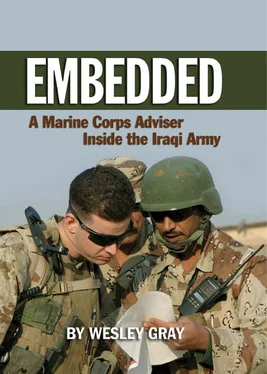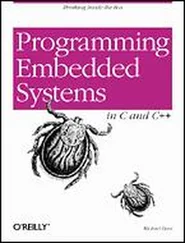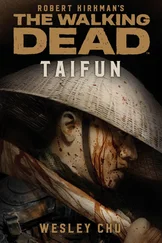Captain Muhanned, the IA battalion S-3 (operations section) officer, led the mission with an outstanding orientation brief. Following his opening remarks, Muhanned called the various sections to the front of the group to describe how their section’s planning efforts would affect the upcoming operation. The S-1 (administration section) talked about personnel and administration, the S-2 (intelligence section) gave the intelligence brief, the S-3 spoke to operations, the S-4 (logistics section) described logistics, and, finally, the S-6 (communications section) described the communications plan. After hearing the various S-shops give their respective briefs, it was time for a question-and-answer session and for another lesson in Iraqi culture.
Lt. Col. Owen Lovejoy, the outgoing MiTT leader, started the session. He pointed out various flaws in the operation plan and asked the jundi how they would address the issues. Silence. In the Iraqis’ mind without their commander Colonel Abass present at the table (he was at a meeting in Al Asad), there was no point even talking about possible changes to the plan. Lieutenant Colonel Ali, the Iraqi’s second in command, kept swatting questions back at Lieutenant Colonel Lovejoy as if they were pesky mosquitoes. Each time his response and rhetoric were the same: “How can I change this plan if the commander is not here to make the decision? As a commander, how would you feel if I were making decisions behind your back? Would you still be the commander?”
The Iraqis’ behavior struck me as odd. In the Marines battle decisions can be made at the lowest levels of command. Subordinate Marines are expected to make decisions when their leaders are not present. In the IA the exact opposite occurs: the commander makes all decisions, even the trivial ones. If the commander does not make all decisions, his authority is undermined. I realized that changing this environment was going to be a serious challenge.
Words of Wisdom from the Marine Colonel
The sandstorm was so thick I could not see more than three feet in front of me. I was driving the Iraqis’ Chevy Luv, a two-door pickup with slabs of metal bolted to the sides acting as armor. We were cruising on the top level of the dam to make our meeting with Lt. Col. Norman Cooling, the 3rd Battalion, 3rd Marines (3/3) commander. The small pickup swayed and dipped at the whims of the storm’s power. At one point, when the winds were particularly fierce, we stopped the vehicle, blocked off all air-conditioning vents, and experienced the insides of a tornado. Within twenty minutes the storm passed, the tornado miraculously transformed into a cloudless, sunny day. The sandstorm had melted into the desert floor.
We faced another sandstorm in our meeting with Lieutenant Colonel Cooling. 3/3 was the unit that would save our asses if the Iraqi army ever decided to mutiny and take the entire MiTT hostage. It made sense for our team to have a good relationship with Cooling. Our meeting took place in the commander’s boardroom, located on the seventh floor of the dam. The room resembled a corporate boardroom setting, save for the fact that it was 100 degrees in the room and we sat in plastic chairs. All the same we were honored and wanted to hear what the lieutenant colonel had to say.
The first words from his mouth stung our adviser team. He lectured, “Here is the bottom line gentlemen: these MiTTs are supposed to be the best of the best, the most capable Marines our Corps has to offer. If the MiTT mission is to succeed in Iraq, that is exactly what we need to be doing.” He paused, sat up in his chair, and continued. “Here is the reality. MiTTs are usually staffed with leftovers… no offense.” We got the drift. His experience with MiTTs in the past apparently had not been that great and he intended to set things straight this time around.
The stressed-out warrior went on. “You want to know what I expect from the MiTT if we are going to get along out here? Solid leadership.” We all gulped, knowing our MiTT leader was nowhere near the hottest on the planet. “You know,” he continued, “here is my experience with Marines dying. For every ten Marines that die out here, two are because of dumb leadership decisions, six of them are because of individual Marine complacency, and maybe two of them are from actual enemy skill and craft. When you break that down, eight out of ten Marine casualties could be saved through solid leadership—first, by making good decisions and second, by ensuring Marines do not get complacent.”
Cooling followed up with an example that still haunted him: “Five months ago a seven-ton full of Marines was told to go check out a wadi (dried river bed) for IED wires. When they got to the wadi , it was heavily pouring rain and the wadi was full of water. The staff sergeant on the scene made the decision to try and cross it. Suffice to say, it was a bad decision; twelve men drowned and one survived—the staff sergeant who made the retarded decision.” He grimaced. “My guess is that poor staff sergeant isn’t sleeping well nowadays.”
Cooling abruptly moved to the next thing on his mind. “Oh, and here is another thing, you now have a microscope up your ass, congratulations.” We were perplexed by his statement. “Well, gents,” he explained, “if you think back about seven months ago you will remember the infamous ‘Haditha Massacre’ where Marines from 3/1 [3rd Battalion, 1st Marines] were accused of killing a bunch of civilians in Haditha. The press went wild with the story, which inflamed world and American opinions. Following the incident, the generals out here decided to jam a microscope up all regimental commanders’ asses in Iraq, and they subsequently grabbed the microscopes from their asses and proceeded to jam them up the battalion commanders’ asses—mine included. Now, following suit, I am now taking it out of my ass and jamming it up yours.”
It didn’t take long to realize Cooling was completely serious. “The situation is so ridiculous,” he continued, “that anytime Marines engage the enemy in my area I have to do an investigation on the incident and verify it was legitimate. I fully understand this may lead to you and your Iraqis hesitating in the heat of battle—I’m sorry. You can thank the media for that one; they have no understanding of the situation on the ground or a grasp of the Iraqi people.” We read between the lines; we were out here to be bullet sponges, and if we retaliated against the insurgents, we were going to be investigated under the assumption we had used force unnecessarily. The media blowback from the so-called Haditha Massacre was going to have a direct effect on our ability to operate.
Lieutenant Colonel Cooling moved away from addressing the negative realities of the war and focused on motivating our team. He lectured, stealing a page from President George W. Bush: “There are two truths to the situation out there. First, if we aren’t fighting these terrorists here, we will be fighting them in America. And second, the only way out of this place is to train the Iraqi army and the Iraqi police so we can leave to fight who we really need to fight—Iran, Syria, and North Korea.”
After that sad attempt at motivation, he told us more about the area. “Here’s a wake-up call. Your training in America is shitty and doesn’t prepare you for what you face out here. And another thing. You are going to have the urge to act like your Special Forces neighbors, who run around like cowboys on convoys, going way too fast and rarely doing the proper precombat inspections and precombat checks. Don’t do that shit. You are Marines, not U.S. Army Rambo wannabes.” The lieutenant colonel did not actually think our training was shitty or that we would try to emulate the Special Forces; he just wanted to stress to us his key point: complacency kills.
Читать дальше












